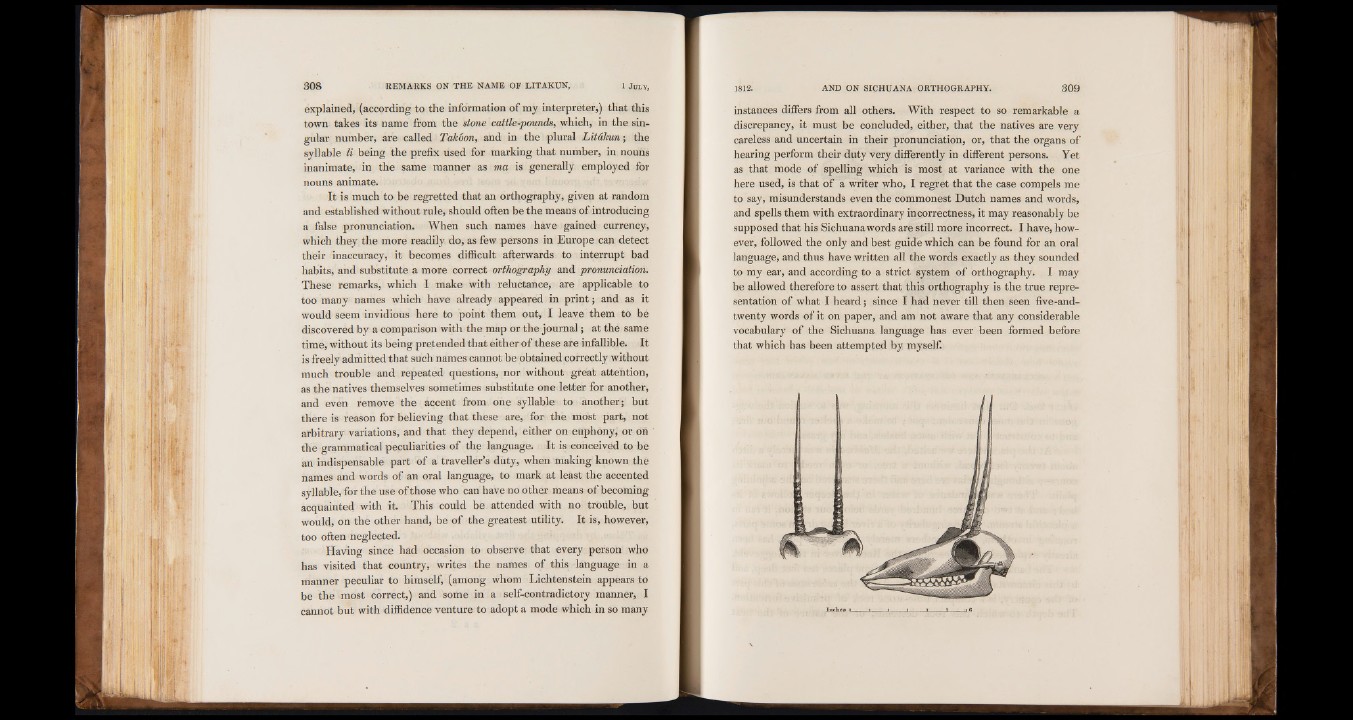
explained, (according to the information of my interpreter,) that this
town- takes its name from the stone cattle-pounds, which, in the singular
number, are called Takoon, and in the plural Litakun; the
syllable li being the prefix used for marking that number, in nouns
inanimate, in the same manner as ma is generally employed for
nouns animate.
It is much to be regretted that an orthography, given at random
and established without rule, should often be the means of introducing
a false pronunciation. When such names have gained currency,
which they the more readily do, as few persons in Europe can detect
their inaccuracy, it becomes difficult afterwards to interrupt bad
habits, and substitute a more correct orthography and pronunciation.
These remarks, which I make with reluctance, are applicable to
too many names which have already appeared in print; and as it
would seem invidious here to point them out, I leave them to be
discovered by a comparison with the map or the journal; at the same
time, without its being pretended that either of these are infallible. It
is freely admitted that such names cannot be obtained correctly without
much trouble and repeated questions, nor without great attention,
as the natives themselves sometimes substitute one letter for another,
and even remove the accent from one syllable to another; but
there is reason for believing that these are, for- the most part, not
arbitrary variations, and that they depend; either on euphony, or on
the grammatical peculiarities of the language. It is conceived to be
an indispensable part of a traveller’s duty, when making known the
names and words of an oral language, to mark at least the accented
syllable, for the use of those who can have no other means of becoming
acquainted with it. This could be attended with no trouble, but
would, on the other hand, be of the greatest utility. It is, however,
too often neglected.
Having since had occasion to observe that every person who
has visited that country, writes the names of this language in a
manner peculiar to himself, (among whom Lichtenstein appears to
be the most correct,) and some in a self-contradictory manner, I
cannot but with diffidence venture to adopt a mode which in so many
instances differs from all others. With respect to so remarkable a
discrepancy, it must be concluded, either, that the natives are very
careless and uncertain in their pronunciation, or, that the organs of
hearing perform their duty very differently in different persons. Yet
as that mode of spelling which is most at variance with the one
here used, is that of a writer who, I regret that the case compels me
to say, misunderstands even the commonest Dutch names and words,
and spells them with extraordinary incorrectness, it may reasonably be
supposed that his Sichuana words are still more incorrect. I have, however,
followed the only and best guide which can be found for an oral
language, and thus have written all the words exactly as they sounded
to my ear, and according to a strict system of orthography. I may
be allowed therefore to assert that this orthography is the true representation
of what I heard; since I had never till then seen five-and-
twenty words of it on paper, and am not aware that any considerable
vocabulary of the Sichuana language has ever been formed before
that which has been attempted by myself.